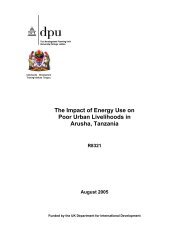EPA Review Annex Documents - DFID
EPA Review Annex Documents - DFID
EPA Review Annex Documents - DFID
You also want an ePaper? Increase the reach of your titles
YUMPU automatically turns print PDFs into web optimized ePapers that Google loves.
Summary of responses to the questionnaire<br />
109<br />
ANNEX I<br />
1. Qns: In your view why did the country engage in the process of <strong>EPA</strong> when there is an<br />
option of full market access under the EBA/GSP preference?<br />
Ans:<br />
a) EBA and GSP schemes are unpredictable and not negotiable as they are unilaterally<br />
offered by EU which means it is non-contractual (or non-obligatory), and can be revoked<br />
at any time by the provider. Negotiating the <strong>EPA</strong> was a wise decision for the country<br />
considering as once agreed; it will be contractual, legally binding, predictable and more<br />
transparent.<br />
b) Unlike in the EBA and GSP schemes the <strong>EPA</strong>, if properly negotiated and implemented,<br />
may provide an enabling environment for both private sector participation and growth.<br />
c) <strong>EPA</strong> promises negotiated and lenient rules of origin (RoO), and sanitary & phyto-sanitary<br />
standards (SPS) unlike the EBA’s stringent and cumbersome RoO and SPS which<br />
makes it impossible to maximise the benefit of LDCs<br />
d) <strong>EPA</strong> promises development support.<br />
2. Qns: What were the expectations at the beginning of the process?<br />
Ans:<br />
a) At the beginning of the process Ethiopia and many of the ACP countries expected that<br />
the negotiation would create an enabling environment for the advancement of their<br />
economies and that the EU would facilitate towards achievement. Nevertheless, this<br />
seemed to have been met with resistance from the EU side given that the community<br />
has been refusing to seriously consider Ethiopia’s financial development benchmarks.<br />
b) Developing ACP countries expected the EU to compensate the losses incurred upon the<br />
government and some of the sectors due to premature liberalisation. However, this<br />
seems to be difficult as the EU has not been forthcoming in terms of increasing<br />
significant financial aid over and above the traditional EDF funding.<br />
c) Many ACP countries had hoped that as a result of these negotiations, their domestic<br />
capacity of trading with EU would ultimately be enhanced. However, to date, this seems<br />
to be problematic as the EU has not been forthcoming in terms of increasing significant<br />
financial aid over and above the traditional EDF funding which would enable ACP<br />
countries to enhance their supply side capacities.<br />
3. Qns: To what extend the constraints of negotiating resources have affected <strong>EPA</strong><br />
negotiations?<br />
Ans: Very significant<br />
4. Qns: Do you think that the <strong>EPA</strong> negotiations require more resources than other<br />
negotiations? If so, why? What specific aspects have been especially cumbersome to<br />
negotiate?<br />
Ans:<br />
a) Yes. Effective <strong>EPA</strong> negotiations demand that the country should conduct detailed<br />
sectoral studies to thoroughly identify the strength, weakness, opportunities and threats<br />
(SWOT) for each of the sectors in terms of competitiveness, both locally and<br />
internationally (in EU market). Sectoral studies were also required to identify sensitive<br />
products and sectors (or exclusion lists) and these were done at a cost.<br />
b) Our negotiators are negotiating with qualified, trained and experiences EC experts. The<br />
negotiators have to be supported by experts on each issue. But due to budget constraint<br />
this could not happen.
















